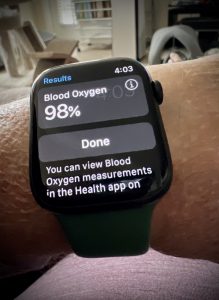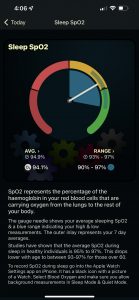-
Smart Watches, Blood Oxygen Levels, and LEMS
Smartwatches have become a marvel at tracking our health and activity. I’ve had one since the beginning and just recently grabbed an Apple Watch Series 7. These latest generation smartwatches often now include pulse oximetry, a measurement of the oxygen levels (saturation) in the blood. As a practicing Registered Respiratory Therapist in the late ’90s and 2000s, pulse oximeters were generally only found in doctor’s offices and in hospitals. Later you could purchase a home-use one at a big box store or pharmacy to keep at home or with you. Now everyone can walk around with a pulse oximeter on their wrist! Here, I’ve just taken a reading while sitting in my chair and watching TV.

Now you must be asking, why is knowing my SPO2 important to my LEMS. LEMS muscle weakness can get severe enough to affect the muscles of breathing. In a myasthenic crisis, this can become severe enough to require mechanical ventilation. I’ve also heard reports of shortness of breath, especially overnight, from LEMS patients. Here’s an overnight oxygen level report from my sleep app, taken from readings on my smartwatch. It takes them automatically.
[caption id="attachment_19411" align="alignnone" width="139"]
 Sleep Report of SPO2[/caption]
Sleep Report of SPO2[/caption]Knowing your “normal” blood oxygen levels can help you understand when your levels are not normal. This data can help you decide to report these to your medical team, or seek urgent care.
What is a “normal” blood oxygen level? Generally, a saturation from 95-100% is healthy, but this can vary based on you and your conditions. Ask your physician what good, expected oxygen levels should be for you. As you wear a smartwatch seeing these readings, you will begin to see where your oxygen saturation levels normally are. Also, generally when blood oxygen levels fall below 90% one should consider why and if you need to seek help. Finally, with any acute shortness of breath, or other significant, unexpected event, a person should seek urgent care immediately.
Here’s a brief, easy-to-understand article on blood oxygen levels from Medical News Today here.
Sorry, there were no replies found.
Log in to reply.
